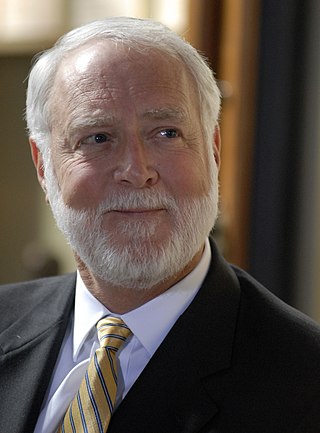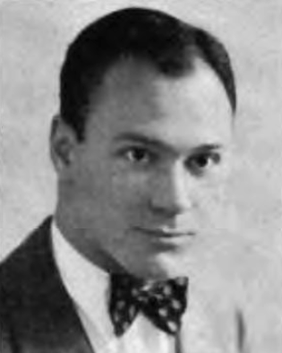Related Research Articles

Gerald Wayne Clough is an American civil engineer and educator who is President Emeritus of the Georgia Institute of Technology and former Secretary of the Smithsonian Institution. A graduate of Georgia Tech in civil engineering, he was the first alumnus to serve as President of the Institute.

The President's Council of Advisors on Science and Technology (PCAST) is a council, chartered in each administration with a broad mandate to advise the president of the United States on science and technology. The current PCAST was established by Executive Order 13226 on September 30, 2001, by George W. Bush, was re-chartered by Barack Obama's April 21, 2010, Executive Order 13539, by Donald Trump's October 22, 2019, Executive Order 13895, and by Joe Biden's February 1, 2021, Executive Order 14007.
Warren Kendall Lewis was an MIT professor who has been called the father of modern chemical engineering. He co-authored an early major textbook on the subject which essentially introduced the concept of unit operations. He also co-developed the Houdry process under contract to The Standard Oil Company of New Jersey into modern fluid catalytic cracking with Edwin R. Gilliland, another MIT professor.

Blake Ragsdale Van Leer was an engineer and university professor who served as the fifth president of Georgia Institute of Technology from 1944 until his death in 1956.
Joseph Mayo Pettit was an engineer and the president of the Georgia Institute of Technology from 1972 to 1986. He previously served as the dean of the Stanford University School of Engineering from 1958 to 1972.
Walter Lincoln Hawkins was an American chemist and engineer widely regarded as a pioneer of polymer chemistry. For thirty-four years he worked at Bell Laboratories, where he was instrumental in designing a long-lasting plastic to sheath telephone cables, enabling the introduction of telephone services to thousands of Americans, especially those in rural communities. In addition to his pioneering research, Hawkins is also known for his advocacy efforts for minority students. He also served as the chairman of Montclair State University in 1973. Amongst his many awards, Hawkins was the first African-American to be elected to the National Academy of Engineering (1975), and, shortly before his death in 1992, he was awarded the National Medal of Technology by then-U.S. president, George H. W. Bush.

Michael Lawrence Haider was an American petroleum engineer, business executive, and a founder of the National Academy of Engineering. He was chairman of what later became Exxon Corporation from 1965 to 1969.

ExxonMobil Corporation is an American multinational oil and gas corporation headquartered in Spring, Texas, a suburb of Houston. Founded as the largest direct successor of John D. Rockefeller's Standard Oil, the modern company was formed in 1999 following the merger of Exxon and Mobil. It is vertically integrated across the entire oil and gas industry, as well as within its chemicals division, which produces plastic, synthetic rubber, and other chemical products. As the largest U.S.-based oil and gas company, ExxonMobil is the seventh-largest company by revenue in the U.S. and 13th-largest in the world. It is the largest investor-owned oil company in the world. Approximately 55.56% of the company's shares are held by institutions, the largest of which as of 2019 were The Vanguard Group (8.15%), BlackRock (6.61%), and State Street Corporation (4.83%).
Carolyn Winstead Meyers is the former president of Jackson State University. Meyers, a native of Newport News, Virginia, earned a bachelor's degree in mechanical engineering from Howard University. She earned a master's degree in mechanical engineering from the Georgia Tech in 1979, and a doctorate in chemical engineering from Georgia Tech in 1984. She completed post doctoral work at Harvard University.

Herschel Herbert Cudd was the director of the Georgia Institute of Technology's Engineering Experiment Station from 1952 to 1954, succeeding Gerald Rosselot in that position. He would later become the president of Amoco Chemical Company and serve on the board of the R. J. Reynolds Tobacco Company.
Henry Clark Bourne Jr. was an electrical engineer, administrator and faculty member at the Georgia Institute of Technology from 1981 until 1993. He was initially recruited by Georgia Tech president Joseph M. Pettit to be Georgia Tech's vice president of academic affairs; Bourne focused on faculty recruitment. Bourne would later serve as Georgia Tech's interim president after Pettit died of cancer in 1986.

Paula Therese Hammond is an Institute Professor and the Vice Provost for Faculty at the Massachusetts Institute of Technology (MIT). She was the first woman and person of color appointed as head of the Chemical Engineering department. Her laboratory designs polymers and nanoparticles for drug delivery and energy-related applications including batteries and fuel cells.

Ralph Landau was an American chemical engineer and entrepreneur active in the chemical and petrochemical industries. He is considered one of the top fifty foundational chemical engineers of the first half of the 20th century, and one of the 75 most distinguished contributors to chemical enterprise. He has published extensively on chemical engineering and holds a significant number of patents.
The Percy L. Julian Award was first given in 1975 by the National Organization for the Professional Advancement of Black Chemists and Chemical Engineers (NOBCChE). The award is given every one to two years. It honors black scientists who have made significant contributions to the areas of pure or applied research in science or engineering.
Frederic Ancrum Lord Holloway (1914–1990) was a former vice president of science and technology at Exxon.

Reginald DesRoches is an American civil engineer who has served as the president of Rice University since July 1, 2022. From 2020 until 2022, he served as provost of Rice. Earlier, beginning in 2017, he was the dean of engineering at Rice's school of engineering, and from 2012 to 2017, DesRoches held the Karen and John Huff Chair at the Georgia Institute of Technology.

Krista Shereé Walton is an American chemical engineer. She is the Robert "Bud" Moeller Faculty Fellow and professor of chemical and biomolecular engineering and the Associate Vice President for research operations and infrastructure at the Georgia Institute of Technology.
Lance Collins is an engineer and professor for mechanical and aerospace engineering at Virginia Tech. He was previously the Joseph Silbert Dean of Engineering at the Cornell University College of Engineering and is now the inaugural vice president and executive director of the new Virginia Tech Innovation Campus.

Gilda A. Barabino is the president of the Olin College of Engineering, where she is also a professor of biomedical and chemical engineering. Previously, she served as the dean of The Grove School of Engineering at the City College of New York, and as a professor in the Departments of Biomedical Engineering and Chemical Engineering and the CUNY School of Medicine. On March 4, 2021, she became the President-Elect of the American Association for the Advancement of Science.
References
- 1 2 3 4 5 6 7 8 9 10 11 12 13 14 15 16 17 18 19 20 "ARNOLD STANCELL". The History Makers. 2012-05-14. Retrieved 2024-05-02.
- 1 2 3 4 5 6 7 "Arnold Stancell '58 ChE Senior Executive at Mobil Named Black Engineer of the Year". The City College of New York. 2021. Retrieved 2024-05-02.
- 1 2 3 4 5 6 7 8 9 10 11 12 "Arnold F. Stancell - 1992 Black Engineer of the Year". 20 Years At The Top: A Generation of Black Engineers of the Year (2nd ed.). Career Communications Group Inc. 2006. pp. 37–40. ISBN 1-4116-7685-8.
- 1 2 "Dr. Arnold F. Stancell". National Academy of Engineering. Retrieved 2024-05-03.
- 1 2 3 "The National Academy of Engineering: A Walk on the White Side". The Journal of Blacks in Higher Education (23): 58–60. 1999. doi:10.2307/2999312. ISSN 1077-3711.
- 1 2 3 "Tech Engineering Professor Emeritus Appointed to The National Science Board". Georgia Tech College of Engineering. 2012-01-04. Retrieved 2024-05-03.